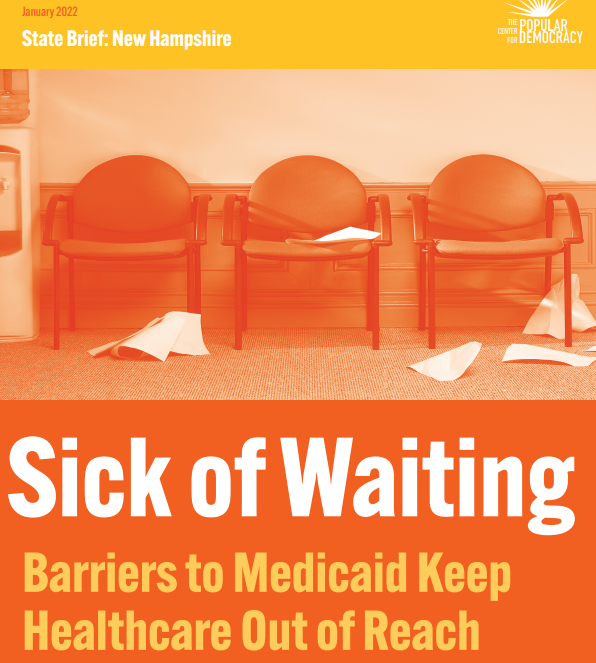See report here: https://indepthnh.org/wp-content/uploads/2022/02/SickofWaiting_New-Hampshire-20220201.pdf
By TERRY FARISH, InDepthNH.org
Manchester mother Marcella Termini says she didn’t know her young autistic twin sons were eligible for Medicaid benefits.
Finally, she learned, through the organization New Hampshire Family Voices, that her sons were eligible for a Medicaid benefit that supports home care for children with severe disabilities. Termini spent hours on each of her son’s applications. It was a long, arduous process.
“Not friendly,” said Eva Castillo, director of NH Alliance for Immigrants and Refugees, of the process.
Castilla has a 27-year old severely disabled son and has experienced the difficult process.
Others attending the virtual press conference Tuesday stated that a main issue was a need to “reform the state computer system.”
The Rights & Democracy Institute brought together spokespeople in health care and government to respond to a new report “Sick of Waiting: Barriers to Medicaid Keep Healthcare Out of Reach.”
The report includes briefs from New Hampshire and six other states and draws in part from Health Care is a Human Right: Examining Barriers to Medicaid Access from Columbia University School of International and Public Affairs.
Presenters were Castillo, Heather Stockwell, Rights & Democracy NH Healthcare Organizer, State Sen. Rebecca Perkins Kwoka, D-Portsmouth, MIRA Coalition, and Gail Brown, Director, New Hampshire Oral Health Coalition.
Stockwell introduced the report, saying, “While Medicaid is a federal program, it is administered at the state level, and this report reveals how New Hampshire’s Medicaid services are failing eligible Granite Staters.”
Rights & Democracy reports that 200,000 people of New Hampshire receive Medicaid benefits but some 60% were challenged by long wait times, frustration or shame in the process, or difficulty in navigating the application process or completing regular re-applications. Common barriers include no internet connection, or lack of clarity on which documents to submit.
Bills are currently before the NH House and Senate to address eligibility barriers.
Brown reported on two bills that would reduce barriers to dental health, HB 103 and SB 422 which address the Medicaid Adult Dental Benefit. Brown said with this benefit, “80,000 people would then have dental coverage.”
Rep. Joe Schapiro, D-Keene, is a sponsor of HB 1578, a bill to make minor and pregnant immigrants eligible for Medicaid benefits. The bill would eliminate the five-year waiting period currently in place to receive benefits.
Perkins Kwoka presented SB 407, a bill she co-sponsors, that would maintain postpartum care for mothers on Medicaid for up to one year.
Stockwell said, “We know some are not paying the bills. We know some have stopped going to the doctor. Certain populations are not engaging with the system at all. Some don’t believe the system will work.”
The report concludes with recommendations for Best Practices for Medicaid Enrollment and Renewal Systems that take into account “the usually limited resources of low-income households.”
They include the need to have in-person staff, “trained to embody the idea that they are expected to help people get healthcare, not stigmatize…”; “Create navigator or assister programs”; and “Create specialized eligibility staff” who can help with such applicants as residents who arrived as refugees.
Rights & Democracy is part of several national coalitions and networks including The Center for Popular Democracy and People’s Action. The Rights & Democracy Project is a 501c4 organization across VT and NH.





